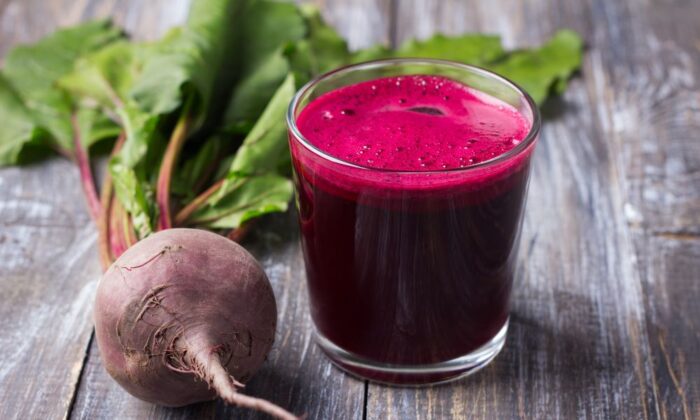Resting blood pressure of less than 130/80 millimeters of mercury (mm Hg) Body mass index (BMI) between 18.5 and 35 Fasting blood glucose level of less than 100 milligrams per deciliter (mg/dL) Hemoglobin A1C level of less than 6 percent Low-density lipoprotein (LDL) cholesterol level of less than 160 mg/dL Study participants first had their blood vessel function tested using ultrasound to monitor blood flow. They were then separated into two groups: Group A and Group B.
Women in Group A consumed one 70-milliliter (mL) bottle (2.36 ounces) of beetroot juice with the nitrates removed to serve as a placebo. In contrast, women in Group B consumed one 70-mL bottle of beetroot juice, which naturally contains high concentrations of nitrates of up to 11.

4 grams per liter. Both groups drank their assigned beetroot juice daily for seven days. On the eighth day, the participants had their blood pressure and pulse measured again, along with a repeat ultrasound to assess blood vessel function and blood flow.
After this initial phase, both groups underwent a two-week “washout” period, during which they did not consume any beetroot juice. Following the washout phase, the groups switched: Group A drank nitrate-rich beetroot juice, and Group B drank the placebo beetroot juice for seven days. On the eighth day, the same measurements were repeated.
Researchers found that blood flow improved by greater than or equal to 1 percent in both early and late postmenopausal participants after consuming nitrate-rich beetroot juice daily, corresponding to a 13 percent reduction in cardiovascular risk. However, the improvement diminished 24 hours after the last dose, leading to the conclusion that daily consumption of beetroot juice can help protect heart health after menopause but is contingent on the timing of supplementation. “Women may need to consume beetroot juice daily—or even more often—to experience all of the potential cardiovascular benefits,” stated David Proctor, one of the study’s researchers and a professor of kinesiology and physiology at Penn State, in a press release.
“Estrogen has been linked with multiple cardiovascular protective properties,” Dr. Vuppuluri told The Epoch Times in an email. Estrogen lowers cholesterol, has anti-inflammatory properties that help reduce plaque buildup in the blood vessels, and helps control blood pressure by inducing vasodilation, which improves circulation in both the coronary and peripheral arteries, he added.
“These are all important for maintaining a good cardiovascular profile and reducing the risk of heart attack and stroke.” Dr. Vuppuluri suggests eating nitrate-rich foods, including green leafy vegetables like spinach and root vegetables like carrots and radishes.
Regularly consuming these foods can increase dietary nitrate intake. “When you consider that most women are postmenopausal for at least a third of their lives, you can begin to understand the potential significance of these results,” she added..


















